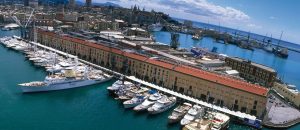
Nick Derrick
Boxship sector teetering “like house of cards” says IUMI committee chief
by James Brewer
Container shipping globally is as fragile as “a house of cards” in the wake of the collapse of South Korea-based Hanjin Shipping, a leading member of the International Union of Marine Insurance has warned.
Speaking ahead of the opening of the annual IUMI conference, for 2016 in Genoa, Nick Derrick,chairman of the body’s cargo committee, said of the bankruptcy of the world’s seventh largest container shipping group: “We are very fearful that other lines will follow suit.
“Where that leaves us, no-one knows.” With banks having declined to keep Hanjin Shipping afloat, Mr Derrick said that this appeared to send a dire message to other container market participants and he likened the sector to a house of cards.
Analysts are still calculating the potential impact of the demise or drastic downsizing of Hanjin. Non-IUMI sources have said that some $14bn worth of cargo was stranded on 141 ships (including 98 containerships) when Hanjin Shipping filed on August 31 to a court in Seoul for receivership, following the withdrawal of credit facilities by banks and other parties. Hanjin is said to owe more than $4bn against the equivalent of $533m in outstanding payments.

Magazzini del Cotone, venue of IUMI conference
Mr Derrick cited an opinion of law firm Waltons & Morse that there is potential for substantial losses where cargo is carried on a Hanjin vessel, for which the owners will inevitably look to their insurers. The concern lies with both cargo on board, and cargo at a port, that has yet to reach its final destination.
Cargo insurers do not, under Institute clauses, cover delay in general — such cover is placed elsewhere on a case by case basis — but they are on risk for delay which leads to damage to perishable cargoes.
Hanjin ships are being denied access to many ports amid concerns that the company will be unable to settle outstanding port fees, said Mr Derrick, who is senior cargo underwriter at Travelers Syndicate Management.
He said that the implications of the Hanjin failure will be a major topic at the conference, which takes place at the Italian port’s congress centre Magazzini del Cotone, a complex of restored cotton warehouses, from September 18 to 21.
IUMI president Dieter Berg said that the near-600 delegates to “the most important conference for the marine insurance world” would hear from 56 speakers on a wide variety of topics ranging from car carrier risks, to cyber risks and big data, to oil price influence on the offshore energy industry, to maritime regulation and safety. Marine underwriters had to include in their strategic vision ways to navigate “the unique selling point” of delivering service.
IUMI ocean hull committee chairman Mark Edmondson said:”The problems that we are used to have not gone away, largely a result of the eroding premium base.”
Hull insurers had to contend with a net increase in capacity over the last year, he said. “Overcapacity has… put a brake on any general improvement in market conditions, although poor performing risks are still subject to meaningful premium increases, on occasion allied to Greater risk audit and management provisions.”
Soft market conditions demanded disciplied underwriting, emphasised Mr Edmondson, who leads marine hull insurance for Chubb at Lloyd’s.
Simon Williams of Hiscox, who is chairman of IUMI offshore energy committee, said that the conference would highlight how little premium there was in the offshore sector, a factor driven by the low crude oil price and fewer assets working. Arguably the situation was worse than previous downturns. “In my opinion, survival is the watchword.”





